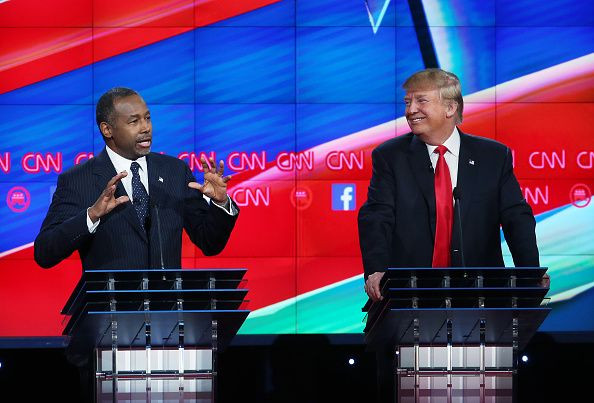Trump Gets Boost From Planned Carson Endorsement

U.S. Republican presidential front-runner Donald Trump got a fresh injection of campaign momentum on Thursday with news that former rival Ben Carson, who is popular with conservatives, planned to endorse him.
A source familiar with Carson's decision told Reuters that Carson, a retired neurosurgeon who dropped out of the race March 4 after failing to gain traction in early voting states, would endorse Trump.
The endorsement could help Trump settle the nerves of those conservative voters who have doubts about whether he truly is one of them.
Carson's plans, first reported by The Washington Post, emerged just before the start of a CNN-hosted debate at the University of Miami that will feature the remaining four Republican contenders: Trump, U.S. Senator Ted Cruz of Texas, U.S. Senator Marco Rubio of Florida and Ohio Governor John Kasich.
Trump has drawn a lot of crossover support from blue-collar Democrats, harnessing working-class anxieties about immigrants and trade to supercharge his bid to become the Republican Party's candidate in the Nov. 8 election.
His White House bid has driven a wedge between the party's moneyed donors and grassroots voters, alarming party leaders who see him as a dangerous demagogue.
Trump's raucous rallies occasionally have descended into violence, including an attack on Wednesday night on a black protester in North Carolina.
Cruz, a first-term U.S. senator, is known for antagonizing fellow Republicans in Washington. On Thursday, he snared his first endorsement from a Senate colleague.
"Ted doesn't believe you have to settle," Senator Mike Lee of Utah told a Miami news conference.
Cruz, 45, aims to push Rubio, also a first-term U.S. senator, and Kasich off the campaign trail in order to position himself as the best Trump alternative.
"We think it's a two-man race," said Cruz backer Saul Anuzis, a former chairman of the Michigan Republican Party.
TRUMP VOWS TO COUNTER FOREIGN RATE CUTS
Trump on Thursday directed his ire overseas, saying the United States should raise tariffs when countries in Europe or Asia lower their interest rates.
His comments came after the European Central Bank on Thursday cut rates and expanded its purchase of debt in another bid to spur lending and economic growth in the 19-nation euro zone.
"We just sit back and do nothing," Trump, 69, said on CNBC television. "That's getting to be very dangerous as far as I'm concerned."
The U.S. Federal Reserve, which had held rates at almost zero percent for seven years in its own bid to stimulate growth, in December raised rates for the first time in almost a decade.
Trump's trade-skeptical message could help him next Tuesday in primaries in Ohio, Illinois and North Carolina, which have lost hundreds of thousands of manufacturing jobs to foreign competition. Florida, Missouri and the Northern Mariana Islands, a U.S. commonwealth in the Pacific, also hold nominating contests that day.
The Florida and Ohio primaries are considered particularly important because both have a large number of delegates at stake and are winner-take-all states, meaning the winner of the popular vote is awarded the state's entire slate of delegates.
Though Trump has made economic issues a central campaign theme, he has steered clear of specifics.
The brash New Yorker has promised to deport 11 million illegal immigrants, temporarily bar Muslims from entering the country and renegotiate trade deals with countries like China to protect American workers.
Critics have dismissed those plans as unworkable at best, and Trump's Republican presidential rivals have pointed out that his resorts have brought in workers from abroad rather than hire Americans.
Our Principles PAC, an anti-Trump group, said on Thursday it would spend $1 million on ads in Ohio that hit him for having shirts and ties made in Asia.
But attacks on Trump have yet to slow him down.
So far, 25 states and Puerto Rico have held nominating contests, and Trump has amassed a solid lead in the delegate race. According to the Associated Press, Trump has 458 delegates, followed by Cruz at 359, Rubio at 151, and Kasich at 54.
Clinching the Republican nomination requires 1,237 delegates. Mainstream Republicans say their best bet now is to stop Trump from reaching that threshold, which, if successful, could enable a compromise candidate to emerge at the party's July nominating convention in Cleveland.
If Rubio, 44, and Kasich, 63, lose in their home states next Tuesday both will face intense pressure to drop out. Polls show Kasich running competitively with Trump in Ohio, but Rubio lags far behind in Florida.
In Wednesday night's violence, sheriff's deputies arrested a 78-year-old white man on charges he punched the 26-year-old black protester in the face at the rally in Fayetteville, North Carolina, the local sheriff's office said on Thursday. The protester was attacked as deputies escorted him away from the event.
"The next time we see him, we might have to kill him," the suspect, John McGraw, told the national television show "Inside Edition."
Trump has occasionally encouraged mayhem. "I'd like to punch him in the face," he said of a protester at a February rally in Las Vegas.
Democratic presidential front-runner Hillary Clinton, 68, said she was "appalled" by the violence.
"This is deeply distressing, and I think as the campaign goes further, more and more Americans are going to be really disturbed by the kind of campaign he's running," she said on MSNBC. Clinton is vying with Senator Bernie of Sanders, 74, for her party's nomination.
© Copyright Thomson Reuters {{Year}}. All rights reserved.





















